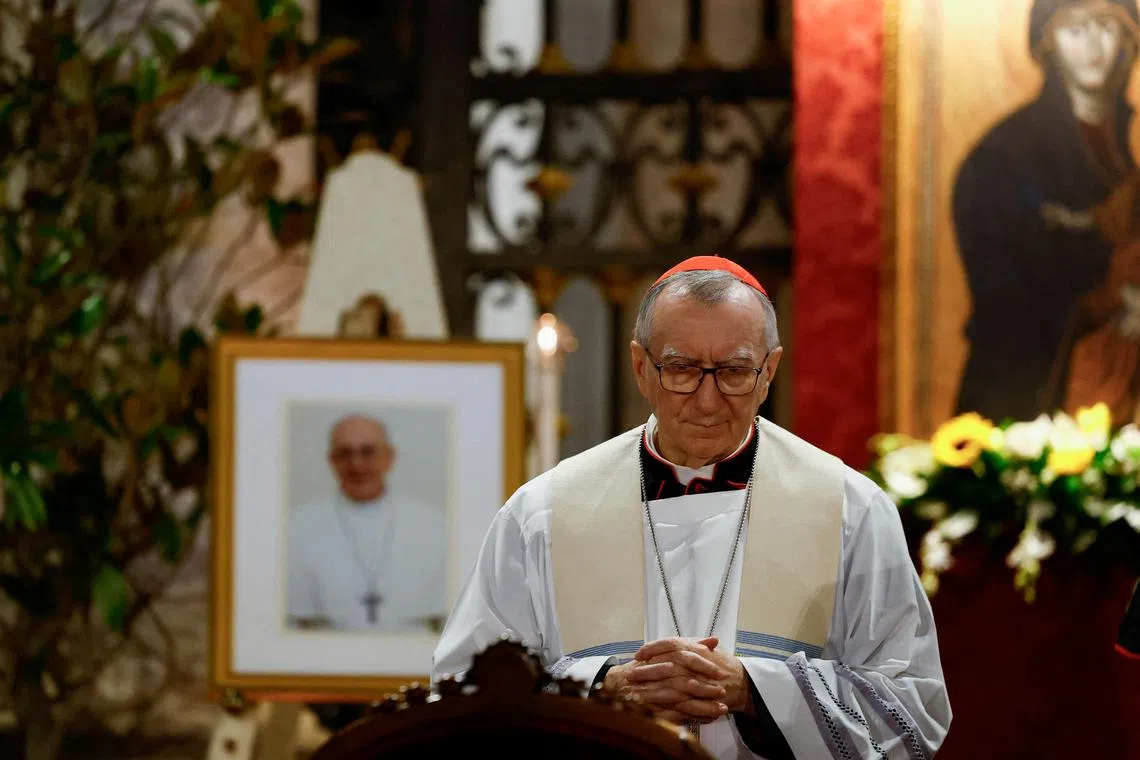Pietro Parolin, a seasoned diplomat, leading race to be pope
Sign up now: Get ST's newsletters delivered to your inbox

Cardinal Pietro Parolin is the favourite to replace Francis, who died on April 21, when the conclave of cardinals starts on May 7.
PHOTO: REUTERS
VATICAN CITY – A seasoned diplomat who worked with Pope Francis for 12 years, Cardinal Pietro Parolin is well known in Rome and abroad, and a serious contender to be the next pontiff.
The 70-year-old Italian was secretary of state – the Vatican’s effective No. 2 – for almost the entire Francis pontificate.
With his air of calm and subtle sense of humour, Cardinal Parolin is the consummate diplomat, a polyglot with experience in Asia, the Middle East and Latin America.
He played a key role in mediating a thaw between the US and Cuba, as well as making a key Vatican agreement with China on naming bishops.
He is the favourite to replace Pope Francis, who died on April 21, when the conclave of cardinals starts on May 7.
Crucially, he has a fine grasp of the intricacies of the Roman Curia, the Holy See’s central government, and was part of a group of cardinal advisers to Pope Francis.
Cardinal Parolin’s moderate positions on many social issues would suggest continuity with Pope Francis if he were to become pope. Sources say he can reconcile the Church’s different factions.
“He’s the best known cardinal. But the question is whether his profile will help create a consensus around him. It could also work against him,” an ecclesiastical source in Rome told AFP, speaking anonymously.
The source noted that Cardinal Parolin “has never had pastoral responsibilities and has taken few positions on societal issues”.
“He has remained in a very institutional role. It is difficult to know what he thinks, which could be a weak point.”
From Vietnam to China
Fluent in French, English and Spanish, Cardinal Parolin is approachable but cautious in public, avoiding any statements that could be misinterpreted – unlike the often outspoken Pope Francis.
He frequently found himself seeking to smooth feathers after an outburst by the late pontiff, notably on the Ukraine war, when Pope Francis alternately offended Ukraine and Russia.
The Argentine Pope appointed Cardinal Parolin shortly after being elected in March 2013 and made him a cardinal in 2014.
Cardinal Parolin was involved in the Vatican mediation that led to the 2014 resumption of diplomatic relations between the US and Cuba.
He was also integral to the signing of a 2018 agreement between the Holy See and China on naming bishops, which has since been renewed. The accord gave both sides a say on appointments and has been a crucial step in improving relations between the two.
However, the deal has been criticised by some conservatives, particularly Americans, who accused Cardinal Parolin of sacrificing Chinese Catholics forced into an underground Church.
Cardinal Parolin advocates for a similar accord with Vietnam.
A life of faith
Cardinal Parolin was born on Jan 17, 1955, into a deeply Catholic family near Venice in northern Italy. His father managed a hardware store and his mother was a teacher.
His childhood was marked by the tragic loss of his father in a car accident when he was 10.
He entered the seminary at 14, was ordained a priest at 25, and studied canon law in Rome. He also trained as a diplomat, joined the Holy See’s diplomatic service in 1986, and has spent the last four decades criss-crossing the globe.
His missions took him to Nigeria until 1989, then to Mexico from 1989 to 1992, to war-ravaged Rwanda and then to Venezuela from 2009 to 2013.
He has declared that priestly celibacy is not a dogma, and in 2023 described as “indefensible” the attempt to link sexual abuse in the Church with homosexuality.
He described celibacy as a “gift from God to the Church” and has denounced abortion and surrogacy as serious violations of human dignity. He also criticised the idea that gender can differ from sex. AFP


